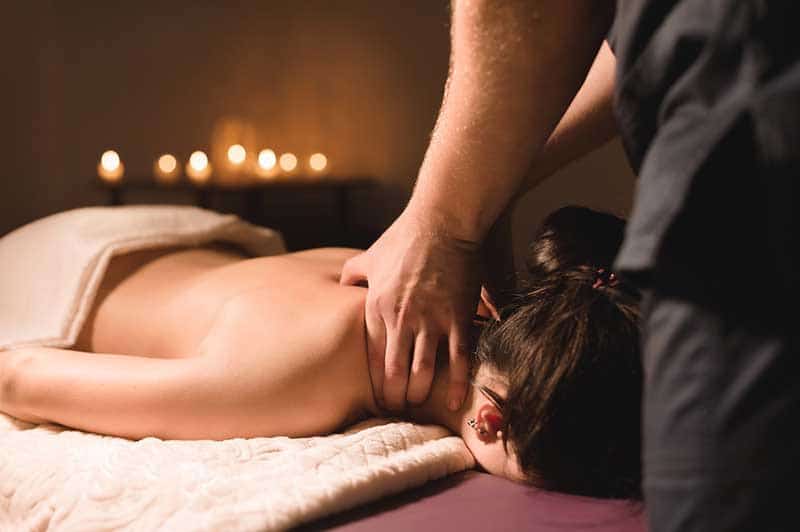
The colors and crisp air of Indiana in autumn can make this an enchanting time of year. But along with the beauty of fall comes fading daylight, colder temperatures, and winter not far behind. With the Daylight Savings Time change, we are already facing shorter, darker evenings. Nearly all of us feel a little down at times during the fall and winter months, but some face an even more intense experience of the winter blues, known as Seasonal Affective Disorder (SAD). It is characterized by sluggishness, fatigue, depression, body achiness, tension, weight gain, and changes in sleep patterns. These symptoms are caused by less daylight, which triggers biochemical changes in our bodies, altering melatonin production, circadian rhythm, and serotonin levels. Some people can move through the fall and winter months hardly affected by these changes, while others experience significant differences in their quality of life.
This is no surprise to massage therapists. Stacey Clevenger, owner of An Inner Peace Massage & Reiki and also Lead Massage Therapy Instructor at IWC, frequently observes this seasonal burden in her clients. “I see an increase in people being tired and stressed,” she says. “People ask more to relax and to have their tension released.”
The good news, as Stacey and other massage therapists will tell you, is that massage is an effective and enjoyable way to help address the symptoms of the season!
Is Massage Therapy effective for addressing Seasonal Affective Disorder?
Yes! A number of the symptoms of SAD overlap with documented benefits of massage therapy, particularly with tension, fatigue, and depression. The most research has been conducted on massage therapy’s effect on depression. For example, a meta-analysis paper published in 2010 found massage therapy “to be significantly associated with improvements in depression.” In fact, massage can be as effective as other interventions for those struggling with depression. The American Massage Therapy Association reports:“The effect of massage therapy on trait anxiety and depression is virtually the same as those routinely found in the research studies of psychotherapy for people with the same conditions.” As for massage therapy’s impact on achiness and tension, anyone who has had a massage is already aware of how well it can work for relaxing the muscles and providing relief!
Why does it work?
Massage therapy can be helpful for depression because it directly impacts the nervous system and neurotransmitters. According to our Lead Instructor, Stacey, “Massage helps those with depression, anxiety, and any other stress-connected issues as it encourages the body to rest and reset as opposed to operating in the fight or flight mode.” Elevated cortisol is one of the key indicators of the fight or flight mode, and scientific studies have documented massage therapy’s impact on cortisol levels. A clinical review published in the International Journal of Neuroscience in 2005 identified an average decrease of 31% in cortisol levels after massage therapy. The same study noted increases in both serotonin (28% increase) and dopamine (31% increase) in response to massage therapy. This is encouraging news about these feel-good neurotransmitters that are key for combatting depression and low moods!
In addition to these kinds of measurable improvements in response to massage therapy, it’s also possible that receiving massages works at a psychological and emotional level to help combat depression and seasonal malaise. Imagine being deep in the heart of winter, suffering from SAD, and feeling like the struggle will never end. Massage might be able to help with that, according to Alice Sanvito, a massage therapist and practice owner in St. Louis:
“Each time one interrupts the pattern and experiences calm, it’s easier to remember what it’s like to live in a more normal state, giving one hope that it is possible.”
Massage therapy can also help address the sluggishness and fatigue that accompany seasonal blues. According to the Mayo Clinic, massage can improve “circulation, energy, and alertness.” That’s a triple win for anyone feeling weighed down by the effects of autumn and winter!
How often to do it?
Don’t we all wish that we could have a massage every week, winter blues or not! But when it comes to addressing ongoing issues, timing and frequency can be significant. Stacey, owner of An Innner Peace Massage and Reiki, recommends the following: “If people are struggling with SAD or any other stressors having to do with the change in season, regularly and consistently scheduled massages are important. Normally, at least one massage a month is a great goal. However, those that struggle with increased stress or depression during the winter months should increase massages to every 2 to 3 weeks.”
Here are some things to keep in mind if you are hoping to benefit from massage therapy during these tough, cold months…
Wishing you a cozy, calm fall and winter under the care of your massage therapist!
Sources:
https://www.ncbi.nlm.nih.gov/pmc/articles/PMC2686645/
https://www.amtamassage.org/resources/massage-and-health/mental-health/
https://www.amtamassage.org/publications/massage-therapy-journal/massage-and-depression/
https://pubmed.ncbi.nlm.nih.gov/16162447/
https://www.mayoclinic.org/healthy-lifestyle/stress-management/in-depth/massage/art-20045743